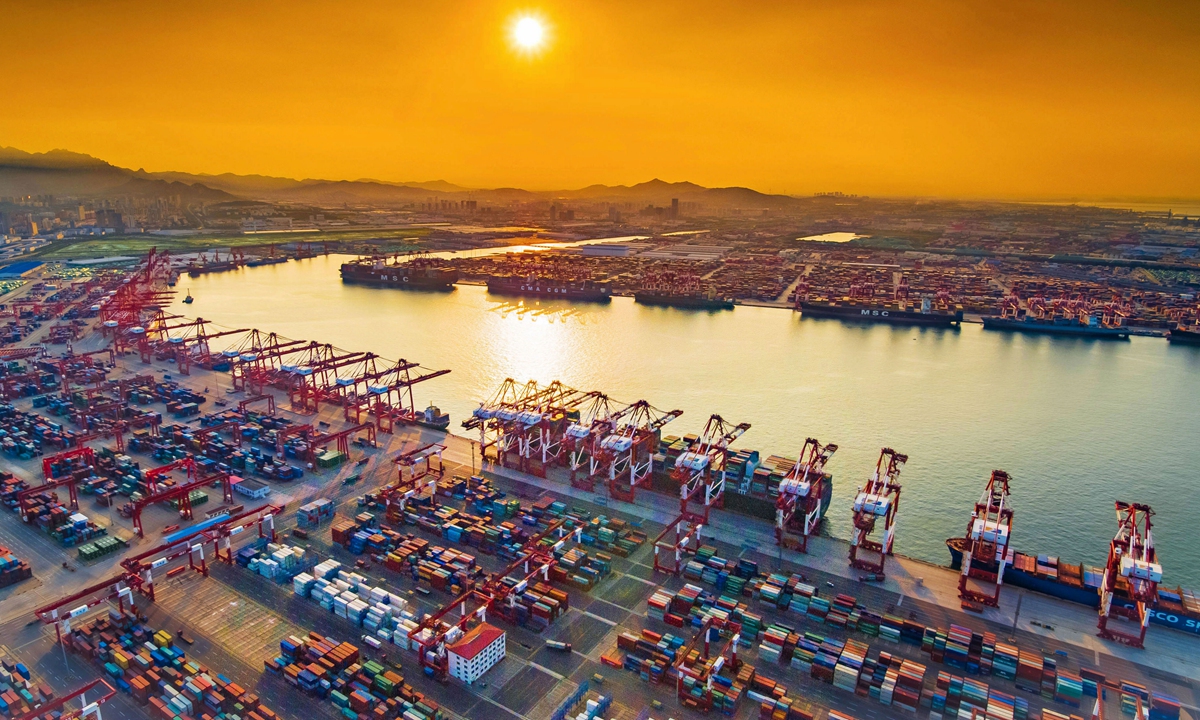Cold-chain foods are being disrupted
By GT staff reporters Source: Global Times Published: 2020/10/21 20:58:40
Pandemic concerns cause higher costs, customs delays

Ports in East China's Shandong Province takes stricter measures over cold-chain transportation, after two asymptomatic patients related to imported frozen seafood were discovered in Shandong's Qingdao. Photo: VCG
Imported cold-chain frozen food has unnerved Chinese consumers since coronavirus was found on a chopping board used for imported salmon and packages of Ecuadorian shrimp a few months ago. Following the latest case in Qingdao, East China's Shandong Province, where live coronavirus was detected in imported frozen food packaging for the first time, domestic cold chain logistics are being disrupted.
Cold chain logistics - a temperature-controlled supply chain used to preserve the shelf life of products including seafood - has been affected by weakened consumption and adjustment of the international cold chain network after virus cases were detected, industry observers and participants told the Global Times on Wednesday. But the impact is controllable under strict quarantine measures, they said.
Xu Jiale, a manager at Qingdao Miracle Import & Export Co, told the Global Times on Wednesday that it now takes more time for imported products to clear customs due to stricter quarantine rules, nucleic acid tests and disinfection.
"Previously, it might only take one month for us to deliver goods to our clients. Now, it probably takes two months, meaning higher prices," said Xu.
Xu noted that some clients might shift to domestic supplies to save money and time, and that could hurt business.
At a press conference on Tuesday, Qingdao's municipal government said every imported cold-chain product will be inspected, and nucleic acid tests will be required for people engaged in the importing cold chain process in ports and cold storage sites, every three to five days.
Living coronavirus was detected and isolated by the Chinese Center for Disease Control and Prevention from the outer packaging of imported frozen cod in Qingdao over the weekend, the first time it has been confirmed that under the special conditions of cold chain transportation outside a laboratory, coronavirus can survive on packaging for a long time.
Given the circumstances in Qingdao, Weng Qiang, a purchasing manager at Sunkfa Holding Group, a leading Beijing-based seafood company, said that importers should avoid goods from Qingdao, because inspections will increase demurrage and port detention costs, and delay the life cycle of fresh products.
"Ports in other regions may have more imported goods instead, but they should adopt the same strict quarantine standard," Weng said.
A sales manager of Shenzhen Antarctic Cold Chain Logistics based in South China's Guangdong Province said the company has been reducing orders of imported goods to avoid the problems. "Plus, foreign trade demand is not that robust so far this year, so our cold chain supply mainly serves the domestic market," said the manager.
Guangdong is home to the largest number of cold chain logistics firms in China, followed by Shandong.
The problems surrounding frozen product imports dented consumer confidence and led many trading firms, food processing companies and restaurants to halt orders, dealing a blow to cold chain services, said Yang Daqing, a veteran analyst in the logistics sector.
"China is a major seafood consumer and importer. As the pandemic in import sources such as the US, Brazil, Ecuador, Canada and Sweden continues to worsen, there's been a shift in the supply chain of cold-chain food and logistics companies," Yang told the Global Times.
China is the top export market for Ecuadorian shrimps. Ecuador's monthly shrimp exports to China increased by 66 percent in September compared with August, as exporters recovered business lost in coronavirus scares since July, when China's General Administration of Customs announced the suspension of three Ecuadorian shrimp companies, industry media Undercurrent News reported on Wednesday, citing data from Ecuador's aquaculture chamber.
Guangdong's logistics industry issued a call last week for the building of a safe, efficient and intelligent cold chain. Imported cold -chain goods that cannot provide the source of purchase should not be transported.
More Chinese cities with cold chain imports have ramped up supervision over recent months to fight against the virus. Since the establishment of a centralized supervision warehouse for imported frozen products in Shenzhen on August 18, 1,390 frozen products that were tested virus-positive have been intercepted, latest data from the Shenzhen market supervision bureau showed.
On the whole, the risks of the imported cold-chain can be controlled. It is necessary to upgrade the sanitation and epidemic control of cold chain import sources, while international coordinated work on the supply chain is equally important, experts said.
Qin Yuming, secretary-general of the Cold Chain Logistics Committee from China Federation of Logistics & Purchasing, told the Global Times on Wednesday that "we have entered a new normal phase in preventing virus-related risks of cold chain imports and Chinese customs has adopted very comprehensive and strict control measures covering the entire process of production, processing, packaging, and transportation from abroad."
It is common sense that China needs vast imports to make up for the shortage of domestic supply, so it is definitely impossible to keep imports outside the door, Qin said.
Meanwhile, he stressed that the domestic cold chain industry should apply more advanced technologies for real-time monitoring of the entire transport process to guarantee safety.
RELATED ARTICLES:
Posted in: INDUSTRIES,COMPANIES